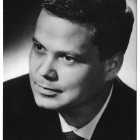Dietrich Fischer-Dieskau Suggest updates
Born Berlin, 28 May 1925.
Died 18 May, 2012.
German baritone.
Dietrich Fischer-Dieskau was one of the most successful and influential European musicians during the half-century after the war. While he was an excellent performer in a range of operatic styles, he generally restricted his operatic appearances to Berlin, Munich, Bayreuth and Vienna. His international career was largely as a concert performer and recitalist, and no other singer had a greater influence on the popularisation of German lieder. If he did not sing much opera in Britain, never mind Scotland, he was still a frequent visitor to the Edinburgh Festival, returning throughout his career.
He grew up in a highly cultured family, developing a love of music and literature from an early age, as well as drawing and painting (a pastime he pursued throughout his life). He studied singing initially with Georg Walter, then with Hermann Weissenborn, until beginning his army service in 1943. He was captured by the allies in Italy, spending two years as a prisoner of war, when he started to give concerts of song. On his return to Germany in 1947 he resumed his studies with Weissenborn, and gave his first public concert that year as well as a radio broadcast of Schubert's Winterreise. During his career, his repertoire of German lieder became vast, with most of the songs of Schubert, Schumann, Brahms and Strauss included, as well as many new works.
He first worked with Furtwängler in 1949. His British debut in 1951 was in a performance of the Delius Mass of Life with Sir Thomas Beecham. The same year he appeared at the Edinburgh Festival accompanied by Gerald Moore, singing Winterreise at the Freemason's Hall. He continued to collaborate with Moore in the USA and at major European venues until the pianist retired in 1967. In 1953 he sang the Brahms Requiem at Edinburgh with the Vienna Philharmonic and Bruno Walter. His extensive range of performances in Edinburgh included repeats of those works with Daniel Barenboim twenty years later.
His operatic debut was in 1948 at the Deutsche Oper, Berlin, as Posa. Munich and Vienna debuts followed the next year. Those three houses remained the centre of his operatic activity where he sang a range of roles by Mozart, Wagner, Verdi and Strauss, in particular. He always avoided singing Papageno on stage (due to his height) and he completely avoided the role of Hans Sachs until 1976, when he recorded Meistersinger with Eugen Jochum. He appeared at the Bayreuth Festival from 1954, his roles including the Herald (Lohengrin), Wolfram, Amfortas and Kothner (Die Meistersinger). He recorded Kurwenal with Furtwängler in 1953 (the legendary set made with Flagstad and the Philharmonia) and again in 1980 with Carlos Kleiber and Margaret Price. Further Wagner recordings include Gunther and Amfortas for Solti, Telramund for Kempe, and Wotan (only Das Rheingold) with Karajan. Other important operatic recordings include works by Berg, Hindemith, Busoni and Reimann, as well as Don Pizarro in Fidelio (which he did not sing on stage) and several Mozart roles - Papageno, Almaviva, Don Alfonso, Don Giovanni. He made recordings of several Verdi parts, including Macbeth, Rigoletto, Germont, Posa, Iago and Falstaff - not necessarily ideal performances, but always with something interesting to say about his character.
He sang plenty of new music during his career. The premiere of Britten's War Requiem in 1962 at Coventry Cathedral was particularly memorable. Operatic roles he created include Gregor Mittenhofer in Henze's Elegy for Young Lovers (Schwetzingen 1961) and the title role in Reimann's Lear (Munich 1978).
He sang little live opera in Britain. His Covent Garden debut in 1965 was as Mandryka in a new production of Arabella conducted by Solti. An appearance as Falstaff a couple of years later was less successful. His Edinburgh Almaviva in 1975 and 1976 was also given a mixed reception. The superb concert performance as Bartok's Bluebeard was looked on more favourably. In the mid-1970s he took up conducting for a few years, and during that period worked with the SNO on a series of concerts that took him to Aberdeen, Dundee and Glasgow, as well as Edinburgh.
Revised 19 May 2012.

